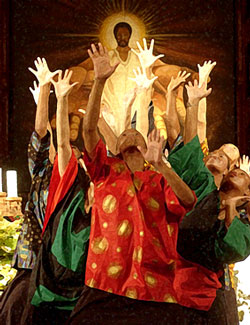By Ron Walters
-Guest Columnist-
Related story: What Rev. Jeremiah Wright Really Said (FCN, 04-20-2008)

It began last year with Fox TV commentators Hannity and Combs calling the theology followed by Dr. Jeremiah Wright’s church a “cult.”
But it continues with recent news articles calling Black Theology a “strange religion” and a “separatist” concept. All of these characterizations are distorted in that they emanate from a perspective outside of the Black community attempting to perceive the fundamentals of a culture that honors the dignity of Black people in its religious practice.
Rev. James Cone was interviewed by National Public Radio in March and he was repeatedly referred to as the father of Black Theology. That may be true in the sense of his composition of the theology, but he would be the first to say that its practice grew out of the historical religious experiences of Black people. I recall that in the book by Professor V. P. Franklin, “Black Self Determination,” he comments on a scene on a plantation where slaves were being preached to by their White master. When the master cited several passages in the bible meant to support his view that slaves should obey their master, they arose and moved to the other side of the room!
The notion had come to Blacks early in their engagement with Christian religion that there was a contradiction between the theological interpretation of their masters, and their own understanding of the message of Amos that the mission of Christians was justice which should “roll down like water and righteousness like a mighty stream,” or that Jesus ordered his disciples such as the prophet Jeremiah to “preach good news to the poor,” or that the basic duty of Christians was to care for the oppressed and despised. In other words, the mission of Christianity appeared to speak powerfully to their own liberation.
In the 1960s, Malcolm X contributed to Black Theology by his demand that Blacks love themselves and in doing so, validate their own humanity before the world. He noted that many Blacks existed in the mental slavery of loving their modern masters and their theology more than they loved their own or themselves. This was a profound observation of a Muslim that many Blacks had received Christianity uncritically and had not interpreted it in the context of their own identity and life challenges. This would all change with the coming of the ideology of Black Power which affirmed the Black self and led to Rev. Cone’s seminal book, “Black Theology and Black Power.”
The view that a people whose humanity had been debased through slavery and civic oppression could express a positive view of their identity was received by many Whites, however, as “separatist.” This, however, represents the perspective of the dominant group (separation from who?) rather than a focus on the empowerment of Black humanity and not a prescription for hating Whites. Moreover in the hands of Dr. Martin Luther King, Jr. even when it was not recognized as a formal theology, Black religion was a moral force that provided an alternate definition of freedom and liberation and the material and spiritual dimensions of life in confrontation with the evils of war, poverty and racism.
Most important, many Blacks were challenged to reinterpret the Christianity they practiced in terms of their own history and identity, leading to the blackening of religious images, the reconceptualization of the identity of Jesus as a White man and the African origins of Christianity by Howard University’s Professor Cain Hope Felder and others. And why not? In every civilization, the evolution of the highest spiritual force is rendered in the context of the culture of the people who are supplicants to it. The Christian religion is an exception only because it was spread with the sword through the Crusades and colonialism. But even then, it has rarely eclipsed indigenous religions, rather, they have merged in a syncretistic dance that allows the indigenous religions to be practiced under the shell of Western religions.
Surveys by Professors Lincoln and Mamiya have found that Black Theology is practiced least by the Black working class Church of God In Christ churches, and most by Black churches with more highly educated and affluent populations and, in any case, it is not the dominant theology of the Black church in general. Nevertheless, the extent to which it opened a window for the exercise of the prophetic exegeses that evaluate the quality of American life, and especially the condition of Black people, in terms of the application of Christian principles of liberation, makes it exceedingly precious and worthy of defense.
Dr. Ron Walters, director of the African-American Leadership Center and professor of Government and Politics at the University of Maryland College Park, is the author of “The Price of Racial Reconciliation.” This commentary was distributed by NNPA.
Related news:
The Attack on Black Theology (FCN, 04-20-2008)
Dr. James Cone: Black Christian or Black American? (BCC Podcasts, 12-05-2007)












